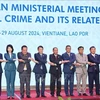Hanoi (VNA) - With its theme on ensuring social security, empowering and creating opportunities for women and girls to achieve gender equality, and eliminating violence against women and girls, the action month once again affirms Vietnam's priorities and commitments in promoting practical progress in the matter.
 The national action month for gender equality and gender-based violence prevention and response takes place from November 15 to December 15 annually (Photo: UN Women)
The national action month for gender equality and gender-based violence prevention and response takes place from November 15 to December 15 annually (Photo: UN Women) The Ministry of Labour, Invalids and Social Affairs (MoLISA) together with UN agencies in Vietnam on November 12 launched the national action month for gender equality and gender-based violence prevention and response, which will take place from November 15 to December 15.
In the past two years, the COVID-19 pandemic has caused a spike in inequality, with women and girls bearing more disadvantages. That is why the group, particularly pregnant women and children orphaned due to the pandemic, has been prioritised for higher aid in Vietnam’s support policies for people impacted by COVID-19.
Speaking at the launching ceremony, Deputy Minister of MoLISA Nguyen Thi Ha said Vietnam had been recognised by international organisations as one of the countries that has made great achievements in gender equality, particularly in the fields of labour, employment, healthcare and education.
The imprint of Vietnamese female leaders in the past years has made great contributions to the local economy. According to a report from the Vietnam Chamber of Commerce and Industry (VCCI), Vietnam has witnessed a significant growth of businesses run by women across the country. By the end of September 2019, 24 percent of the total number of businesses nationwide are owned by women, the highest percentage of women-led businesses in Southeast Asia.
However, Ha said Vietnam still faces challenges in ensuring gender equality.
Ha stressed that, in order to address gender inequality in Vietnam, in addition to policies and programmes to ensure social security, long-term communications efforts should be carried out more regularly and effectively to change gender bias, which is quite common in all aspects of social life.
“There would be no gender equality without the participation of men in domestic work and without an end to violence against women and girls,” the deputy minister said.
Kidong Park, acting United Nations (UN) Resident Coordinator in Vietnam, affirmed the UN is committed to continuing to assist Vietnam in promoting gender equality, and eradicating discrimination and gender-based violence toward the nation’s realisation of the UN’s sustainable development goals.
Park noted that, in order to tackle the roots of these issues, apart from changing social norms through building a culture of respect and equality for all genders in all contexts, including at home, at work, at school, and in the cyberspace, there is a need for a strong political commitment that manifests in the making of comprehensive laws and policies.
In 2015, the Prime Minister approved a national action programme on gender equality for the 2016-20 period, which focuses on rolling out various types of awareness campaigns.
Under the programme, gender equality is promoted in schools, businesses and industrial parks. Men and boys are encouraged to take part in communication campaigns to eliminate gender imparity.
Besides this, the "action month for promoting gender equality and preventing gender-based violence" focuses on presenting themes and messages relevant to the issue and honouring individuals and organisations that actively promote such messages.
The programme also aims to enhance the capacity of elected female officials, National Assembly female deputies and female leaders from the grassroots level upwards to suggest policies related to the training and appointment of female officials.
Ministries, sectors, localities and organisations are encouraged to build models to increase women's engagement and promote gender equality in areas at risk of gender inequality./.




















